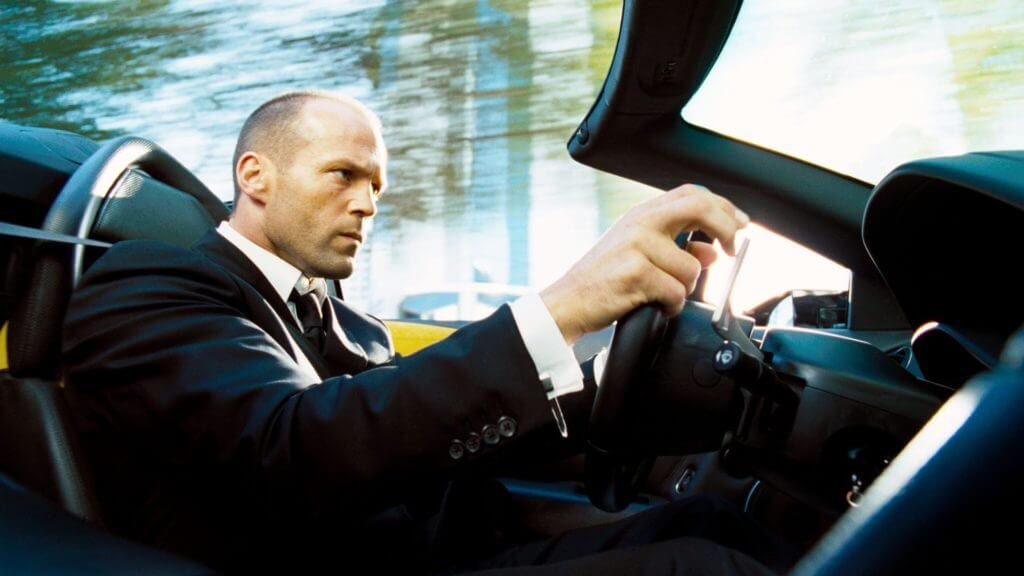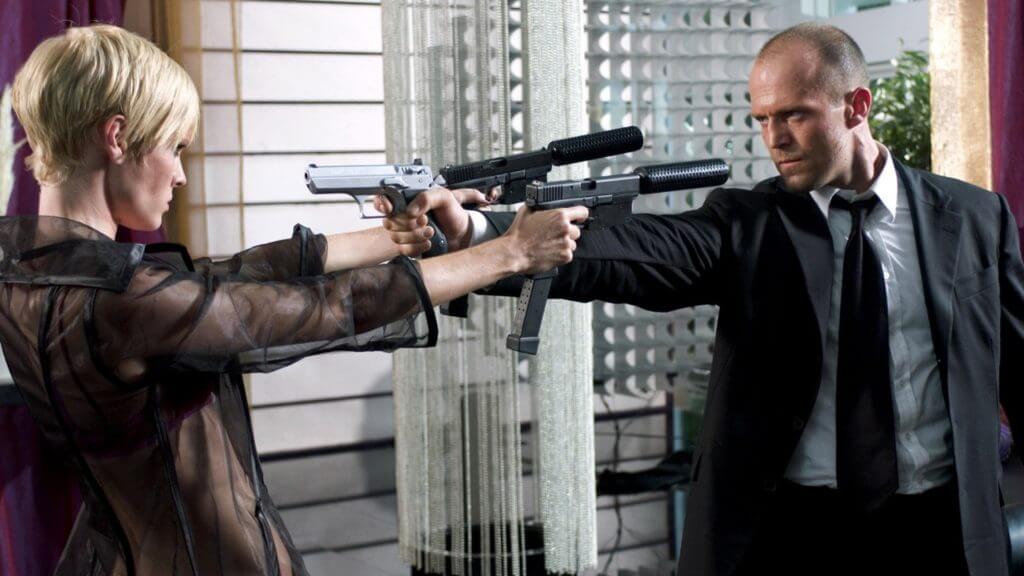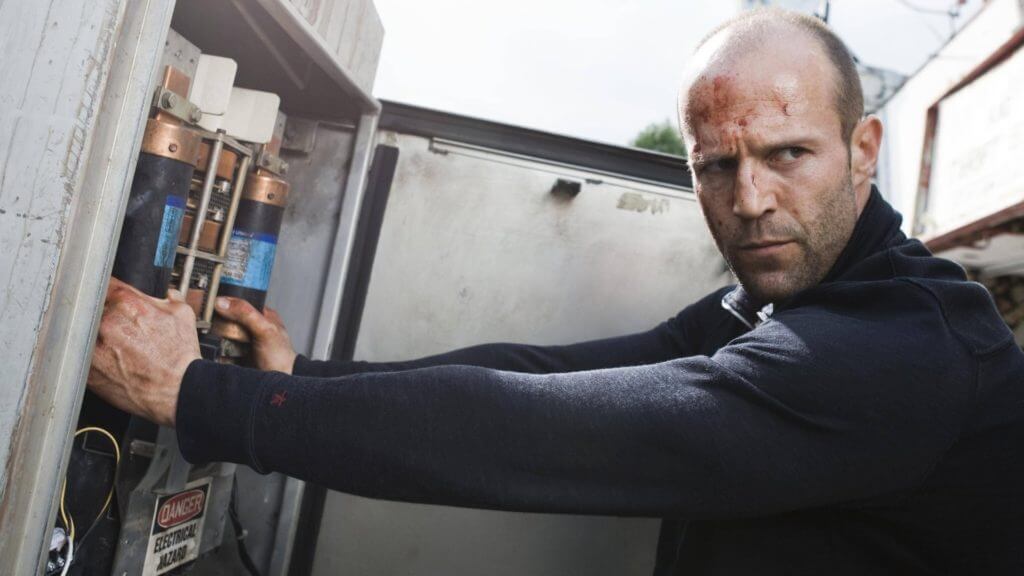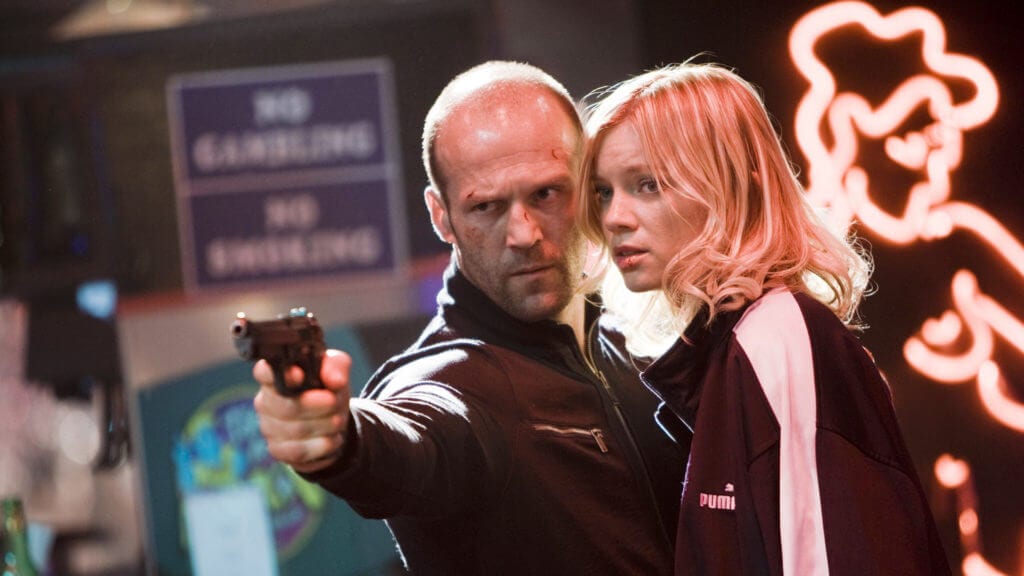A Man’s Man
I am a massive Jason Statham fan. There are lots of reasons why I like him; he’s the sole modern action hero that feels like he comes from the age of legends like Schwarzenegger and Stallone, he’s got an incredible screen presence, he deals out violence like no one else, and he’s one of those guys that’s just effortlessly cool. In addition to all of that, Jason Statham is masculine in a way few movie personalities are today. It’s a part of his throwback nature, but he’s the type of man that seems to have largely gone out of style, and while there are lots of great characters and actors today it’s nice to see someone like Statham still carrying the torch for that era of manliness. Even when going old school, though, there’s more than one type of masculinity, and two of his most famous characters exemplify two different versions of a man, albeit ones who share some similar qualities.
*Spoilers for the movies mentioned*
Frank Martin, The Transporter (2002), Transporter 2 (2005) and Transporter 3 (2008)

Frank Martin is a gentleman. He wears nice suits to work, and his leisure clothes are fairly fashionable as well. He drives fancy European cars customized to his specifications. He lives in a luxurious villa on the coast of France. When at work, he is a consummate professional who treats his clients respectfully while demanding respect for himself. He holds himself to a very strict standard, abiding by three rules to ensure his jobs are all neat, tidy and safe – he never changes the deal, he never asks for anyone’s name, and he never looks inside the package he’s transporting. And though his job is dangerous, he avoids conflict whenever possible.
Conflict comes, of course, and when it does Frank annihilates anyone stupid enough to threaten him. It’s important to note, though, that Frank never seeks out a fight. Every time he goes into action, it’s because either his life or someone else’s is in danger – or someone’s about to jack his car – and all possibilities of a peaceful resolution have failed. In the first film, he doesn’t fight anyone (aside from a few highway cops who stumble upon him, and he’s angry that it comes to violence) until the bad guys set him up to die in an explosion. After that, he brings the fight to them, because it’s them or him. Even at the end, when he destroys the slave-trading operation, he only goes into battle because the police are powerless to do anything. In the second movie he’s protecting his new package, a young boy whose influential parents have hired him as a valet for their son; eventually, he’s fighting for his own life as well as the lives of countless innocent people who will be exposed to the virus the villains have unleashed. In Transporter 3, he’s had a bomb attached to his wrist, forcing him into the fray if he wants to live another day (although saving Valentina becomes more of a priority for him as the movie goes on).
Even when things get physical, Frank is measured in his violence, only dealing out the amount necessary to bring the conflict to an end. He incapacitates the cops in the first movie with as little pain as possible, while he makes sure the car thieves in the second wake up knowing they’d better think twice before stealing from anyone again, and when he finally faces the villains at the end of all three he uses lethal force (save Transporter 2, where Gianni needs to be brought in alive, but his henchmen aren’t so lucky). There are different degrees of beatings he gives throughout, and all serve to illustrate how he carefully considers the exact amount of punishment his opponents need.

When it comes to women, he’s respectful, never pursuing them and waiting for them to show unequivocal interest in him before giving in to his carnal desires. Both Lai in The Transporter and Valentina in Transporter 3 are in emotionally vulnerable states – being kidnapped and all – and he tries to rebuff their advances before relenting and sleeping with them. In fact, in Transporter 2 he turns down Audrey, a very attractive married woman who tries to seduce him, because it would be immoral to have sex with another man’s wife. (“Why? Because of who I am?” “Because of who I am.” There’s actually an interesting story where highly underrated director Louis Leterrier intended for scenes like this to have the subtext that Frank is gay; based on what Leterrier has said this sounds more like something he included to amuse himself as opposed to being canon, and this scene works better as an example of Frank’s strict sexual morality, but it’s fun to watch the movies again and think about it.) However, when he’s on the job he treats them no differently than he would a man; he’s harsh with Lai and Valentina, and takes pity on them more because of their innocence than their gender. And when he fights Lola at the end of Transporter 2, he has no qualms about killing her in brutal, bloody fashion.
Frank’s villains highlight his moral and professional standards by being completely devoid of them. Wall Street wants Frank to alter his deal, then tries to kill him when Frank says no, effectively trying to punish Frank for having rules. He uses extreme violence to tie up loose ends instead of being a professional and judging the situation logically. He even kills his own people to shut them up. Gianni uses a child to spread his virus, and he forces Frank to break his own rules to save the boy. Johnson is a combination of the two, not respecting Frank as a fellow professional and making Frank break his rules to survive; he also kills one of his own men, as Wall Street does. Though he’s a criminal himself, Frank has no respect for these three guys, and doubtless wouldn’t consider them real men at all.
Thus, Frank Martin is the embodiment of refined masculinity, living a structured life with rules and order, but only those he has imposed on himself. He breaks the law for a living, but he does it with respect and pride, with a nice suit, a snazzy car and a code of honor he’ll die before he breaks. While the animalistic furor of unbridled savagery lies within him, he always keeps it in check, letting it out only when the situation calls for it and preventing it from consuming him. Frank has tamed his inner beast and is in complete control at all times, and there’s nothing manlier than that.
Well, except maybe…
Chev Chelios, Crank (2006) and Crank: High Voltage (2009)

If Frank Martin is a man in control of his inner beast, Chev Chelios is a man who has completely given in to his. Chev is everything Frank is not; unrefined, uncultured, vulgar, relentlessly violent, overtly sexual, and obeying few if any rules, self-imposed or otherwise. He’s a hurricane of a man unleashed on the world around him, and he doesn’t think twice about the destruction he wreaks.
Unlike Frank, we don’t really see Chev at work. In both films he finds himself in an extremely deadly situation on his day off, running for his life as he needs to keep his adrenaline pumping and his heart rate at roughly the speed of a bullet train. He can’t be measured because if he stops for one moment, he’ll die. So Chev propels forward, driving stolen cars, stealing what he needs, killing anyone who gets in his way and laughing the entire time. Frank Martin deals out violence because he has to, but Chev Chelios looks like he loves hurting the people who hurt him, constantly finding new and inventive ways to inflict pain. Chev doesn’t fight for any kind of greater good, just self-preservation and revenge; he’s like an animal in the jungle, surviving only because he’s the meanest beast around.
That isn’t to say he’s a complete monster. Chev has a certain moral code by which he lives, even if it’s much, much looser than Frank Martin’s. Chev prizes honor and loyalty above all else. He’s pretty nasty to everyone he meets, but once they show their loyalty to him, he softens. Chev’s own loyalty is rewarded as well, such as when Don Kim helps him eliminate Verona and Carlito as a thank-you for Chev’s sparing his life. After his actions lead to Kaylo’s death, he takes steps to help Kaylo’s twin brother Venus get whatever measure of revenge he can, and Venus returns the favor by helping Chev throughout High Voltage. In Chev’s world, however, loyalty can be fleeting, and Chev has no mercy for those who betray him; Don Kim turns on Chev in High Voltage for a payout from a powerful Chinese gangster, and Chev kills him and his men without a moment’s hesitation. Beyond this, Chev has a friend in Doc Miles, who seems to genuinely like Chev, calling him a “good dude.” Doc Miles helps Chev consistently and without question, proving loyalty to a man who, it’s safe to assume given the fairly consistent theme, has been loyal to him. Loyalty is everything to Chev Chelios because a man is only as good as his word.

In that vein, Chev is loyal when it comes to women as well, or in his case one woman: Eve. Frank has a different love interest in each movie (even if one of them goes unrequited), but Chev has a steady girlfriend, and he loves her. He may lead with his sexuality a lot, be it by gawking at strippers or coarsely complimenting bikini-clad women at El Huron’s pool, but when it comes to love and sex, he only wants Eve. He shouts and curses at pretty much everyone in both films, but he’s always soft and loving with Eve; on the one occasion that he loses his temper and yells, he immediately apologizes, something he’d never do for anyone else. When he believes he’s about to die, he makes what he expects to be his final living act to call her, apologize for letting her down and tell her how much he loves her. Then, when he recovers from his near-death experience, he seeks her out right away. When he kisses Ria at the end of High Voltage, it’s because he’s delirious and thinks she’s Eve. And, above all, he wants to protect her. She’s the one thing he values more than his own life, and that is the dichotomy at the heart of Chev Chelios; he’s extremely selfish, yet he cares about Eve more than himself because that’s how a man treats his woman.
That doesn’t mean he’s above using her to keep himself alive, though. In both films, Chev finds himself about to succumb to his poison/artificial heart, and the only way he can keep himself going is by getting physical with his lady. In the first movie, it’s Chev who initiates it, aggressively pursuing sex in a very public place while Eve is not particularly happy with him; in High Voltage, Eve volunteers at first, though she soon gets creeped out by the emphasis on friction as opposed to aerobics and Chev once more becomes forceful. In both cases, Eve is soon overcome with desire and joins in enthusiastically, turned on by Chev’s raw masculinity. (As I argued about a similar moment in Goldfinger, scenes like this shouldn’t be held to literal real-world standards but seen for what they represent; Crank perhaps even more so because it exists in such a heightened reality.) Notice, too, that in both cases there are plenty of other women Chev could attempt to bed, and he’d likely be able to cite his imminent death as an excuse; still, the only woman he even considers – outside of a very funny, not to mention chaste, run-in with an old lady in High Voltage – is Eve.
Like with Frank, the villains Chev fights compliment his emphasis on loyalty and individuality. Verona is a weasel, wearing the guise of a man’s man while actually ingratiating himself with figures more prominent than he, seeking whatever scraps of power he can be fed; contrast this with Chev, who chose not to kill for Carlito. Carlito, as the boss, shows disloyalty when he throws Chev to the wolves for following an order (ironically an order Chev actually didn’t follow), letting a man who’s earned his trust take the blame for Carltio’s own decision; it could even be argued that Carlito’s betrayal of Chev is Chev’s own disloyalty to his boss coming back to bite him. El Huron, on the other hand, is just like Chev, valuing loyalty first and hunting down Chev to get revenge for his brothers’ deaths. His opposites and his mirror images all seem to want Chev dead.
Chev Chelios is the personification of the basest form of masculinity, a man who takes what he wants and doesn’t care what anyone thinks of him. He embraces his id instead of suppressing or controlling it, and he’s all the happier for it. He wears his lust and aggression on his sleeve, but they’re right next to his heart. The subtext of these movies is unmistakable: Chev cannot suppress his masculinity even for a second or he will literally die. He can’t give in to society’s rules and social norms; he must be who he is, or there’s nothing for him.
***
Both of these characters represent a very real form of masculinity, and while one takes pride in cultivating his, the other just does what comes naturally to him. What’s important is that they both develop these personas not because they’re forced to, but because they want to. Their personalities make sense to them, and that’s all that matters. And, above all, neither one could have been played by anyone but Jason Statham.







